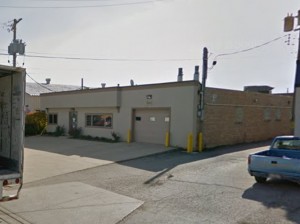FBI investigates Schiller Park human body-parts lab
By Jean Lotus Staff writer — January 14, 2016The FBI raid on a Schiller Park crematorium last January revealed construction-grade electric handsaws were used to dismember cadavers for sale in an illegal multi-state body parts ring, new information shows.
The FBI is investigating the alleged sale of diseased human tissue from donors with HIV, hepatitis B and C, sepsis and MRSA.
“A whole human cadaver is worth less than when that is dismembered and sold as individual body parts,” wrote Detroit FBI Agent Paul M. Johnson in a search warrant affidavit. Human heads can be sold for $500 each, and elbow and knee joints can fetch hundreds of dollars, Johnson said.
Most of the more than 1,000 human body parts seized in 2013-14 raids of two related businesses in Arizona and suburban Detroit belonged to Illinois residents dismembered in Schiller Park, the FBI has alleged. Among body parts sold by BRC-Illinois personnel were specimens from diseased donors, the FBI alleges.
During the Illinois raid, the FBI brought along agents from the Centers for Disease Control and the National Institute for Occupational Safety and Health (NIOSH) Jan. 13-14 to visit the workspace of Cremation Services, Inc., 9329 W. Byron Ave.
A report shows what federal inspectors found when they toured the crematorium.
For three days, the FBI and CDC removed bags of body parts from the Schiller Park building. They also removed files and computers from the offices of Biological Resource Center-Illinois, a for-profit willed body-to-science company and tissue bank at 9501 W. Devon Ave. in Rosemont.
Inspectors from NIOSH interviewed five employees and father-and-son owners Donald Greene Sr. of Rosemont and Donald Greene Jr. of Des Plaines. They toured the crematorium observing workplace conditions and reviewing safety documents.
As of now, no charges have been filed against the Greenes nor any other employee of BRC-Illinois, nor have the Greenes had their funeral/cremation licenses revoked.
The crematorium is still running, according to the Greenes’ lawyer, Daniel Fahner.
On their cached website, the company said, “Biological Resource Center acts as a ‘bridge’ between those individuals who donate their body and the medical research and education community.”
Stephen Gore, of Biological Resource Center in Phoenix, pleaded guilty in October 2015 to selling diseased body parts and selling non-organ human tissue without donor permission.
At the Schiller Park crematorium, federal inspectors were looking for occupational exposure to “blood-borne pathogens during the acquisition, handling and dissections of donated human cadavers,” the report says. The two inspectors were identified as a Hazard Evaluations Dept. medical officer and an industrial hygienist.
The building had been observed by the FBI for some time before the raid.
“Funeral home vans and hearses were observed regularly visiting the facility and backing inside the roll-up door at the front of the building, as were various delivery trucks,” the FBI report said.
Although they did not witness a cremation or the harvesting of body parts, agents from NIOSH did remark on something unusual.
Along with special oscillating bone-cutting saws, they observed several “construction-grade sawzall [sic] oscillating saws,” the report said.
“Oscillating saws used to cut bone are known to produce aerosols,” the CDC report said. “Including particles that could contain infectious agents.”
Specialty autopsy bone saws cost around $2,500, in online medical supply catalogs and replacement blades are expensive. Sawzalls cost a little over $100.
Paul Dudek, executive director of Chicago’s not-for-profit Anatomical Gift Association, which also accepts willed bodies for scientific research, said the AGA only uses medical autopsy saws for dissection.
Construction-grade saws are “very powerful and very dangerous,” Dudek said. “I imagine they destroy more tissue than they save.”
What made the situation more dangerous was crematorium employees admitted they “did not typically wear respiratory protection when using these instruments,” the NIOSH report said. Employees were at risk from blood-borne diseases if they did not wear masks and take other precautions.
The lab room was not properly ventilated, NIOSH found. Using ventilation smoke tubes, inspectors saw that air flowed out of the prep laboratory into the adjacent receiving dock and the cremation oven rooms. This meant “airborne contaminates from the laboratory can spread to these other areas,” the report said.
Employees at the crematorium also told inspectors about the “quarantine” process for determining whether a cadaver had infectious disease. Blood samples were sent to a serology lab, and when the cadaver was declared disease-free, the tissue could be processed.
But they did not know the FBI search warrant, filed under seal, alleged this timeline was not always followed. The warrant alleged that in 2012, an infected human head seized in a shipment at the Wayne County Metropolitan Airport was fraudulently labeled as disease-free, with Parkinson’s listed as cause of death. But a death certificate indicated the donor died of sepsis and a timeline allegedly showed the body’s tissue was harvested a day before serology results were returned. This information was obtained by subpoena, the FBI said.
Because human tissue banks are an unregulated industry, the inspectors used recommendations from the CDC’s autopsy lab standards.
The Greenes’ attorney, Fahner, said the NIOSH inspection was successful.
“Employees [of BRC-IL] took safety precautions in the course of their handling of human remains. These were experienced people. They had the proper training, manuals, everything” Fahner said. “The employees said they operated within industry standards.”
The NIOSH report recommended employee training and medical testing for employees, which Fahner confirmed took place.
“No employees tested positive for pathogens,” he said.
The letter also recommended using specialty medical saws instead of construction saws and re-ventilating the processing lab.
The CDC and NIOSH shared their recommendations with the Cook County Health Department and the Illinois State Board of Health, and gave a copy to BRC-Illinois.
Biological Resource Center-Illinois is still operating, their attorney said, but the company ceased its donor program in July 2015.
Related content: Arizona guilty plea in multi-state illegal body-parts ring
— FBI investigates Schiller Park human body-parts lab —








